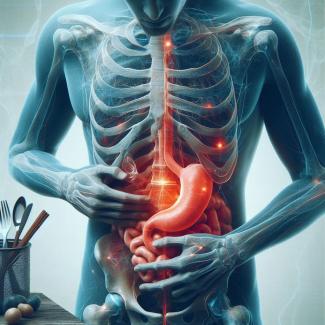
Helicobacter pylori, often abbreviated as H. pylori, is a type of bacteria that can infect the stomach lining and cause various digestive problems. Here's an overview of H. pylori, including its symptoms, causes, diagnosis, and treatment:
Symptoms:
- Gastritis: H. pylori infection is a common cause of chronic gastritis, which can lead to symptoms like stomach pain, bloating, and indigestion.
- Peptic Ulcers: This bacterium is a significant cause of peptic ulcers, which can result in abdominal pain, often described as a burning or gnawing sensation. These ulcers can also lead to complications such as bleeding or perforation.
- Reflux Esophagitis: H. pylori infection can contribute to the development of gastroesophageal reflux disease (GERD), leading to symptoms like heartburn, regurgitation, and chest pain.
- Stomach Cancer: In some cases, long-term H. pylori infection can increase the risk of stomach cancer, although this is relatively rare.
Causes: H. pylori is primarily transmitted from person to person through direct contact with saliva, vomit, or fecal matter. The exact mode of transmission is not entirely understood, but it is believed to occur through close person-to-person contact, such as through:
- Oral-oral transmission (kissing, sharing utensils)
- Fecal-oral transmission (contaminated water or food)
Diagnosis: Diagnosing H. pylori infection usually involves one or more of the following methods:
- Blood Test: A blood test checks for the presence of antibodies against H. pylori, indicating current or past infection.
- Stool Test: This test detects H. pylori antigens in the stool, which can be helpful in diagnosing an active infection.
- Breath Test: The patient consumes a special substance, and the breath is tested for the presence of labeled carbon dioxide, which is produced by H. pylori in the stomach.
- Endoscopy: A flexible tube with a camera is inserted through the mouth into the stomach to directly visualize any ulcers, inflammation, or take biopsies for testing.
Treatment: H. pylori infection is typically treated with a combination of antibiotics and acid-suppressing medications. Common treatment regimens may include:
- Triple Therapy: A combination of two antibiotics (such as clarithromycin and amoxicillin or metronidazole) and a proton pump inhibitor (PPI) like omeprazole.
- Quadruple Therapy: This includes two antibiotics, a PPI, and bismuth subsalicylate.
- Sequential Therapy: A regimen where antibiotics are taken in two different phases.
It's important to complete the entire course of treatment as prescribed by a healthcare provider to ensure the complete eradication of the infection. After treatment, follow-up testing may be performed to confirm that the infection has been successfully eliminated.
If left untreated, H. pylori infection can lead to chronic health issues, including peptic ulcers and an increased risk of stomach cancer, so it's crucial to seek medical attention if you suspect you have an H. pylori infection or are experiencing symptoms related to it.






